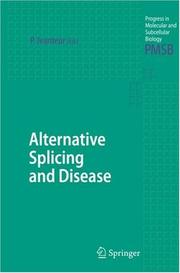| Listing 1 - 3 of 3 |
Sort by
|
Book
ISBN: 1634842677 9781634842679 1634842669 9781634842662 Year: 2016 Publisher: New York
Abstract | Keywords | Export | Availability | Bookmark
 Loading...
Loading...Choose an application
- Reference Manager
- EndNote
- RefWorks (Direct export to RefWorks)
Genetic polymorphisms. --- RNA splicing. --- Medical genetics. --- Messenger RNA splicing --- Splicing, RNA --- Genetic regulation --- Polymorphisms, Genetic --- Population genetics --- Clinical genetics --- Diseases --- Heredity of disease --- Human genetics --- Medical sciences --- Pathology --- Genetic disorders --- Genetic aspects
Book
ISBN: 1281397636 9786611397630 3540767762 3540767754 3642095445 Year: 2008 Publisher: Berlin : Springer,
Abstract | Keywords | Export | Availability | Bookmark
 Loading...
Loading...Choose an application
- Reference Manager
- EndNote
- RefWorks (Direct export to RefWorks)
In recent years nuclear pre-mRNA processing has taken center stage as an important regulator of gene expression and ultimately growth and development. Large-scale genome and cDNA sequencing projects together with bioinformatic analyses of these sequences have revealed that alternative splicing of pre-mRNAs contributes greatly to transcriptome and proteome complexity in eukaryotes. During the last few years, tremendous progress has been made in understanding various aspects of pre-mRNA processing including alternative splicing and its importance in plant growth and development as well as in plant responses to hormones and stresses. This book, with contributions from leading scientists in this area, summarizes recent advances in nuclear pre-mRNA processing in plants. It provides researchers in the field, as well as those in related areas, with an up-to-date and comprehensive, yet concise, overview of the current status and future potential of this research in understanding plant biology.
Plant genetic regulation. --- Plant gene expression. --- Messenger RNA. --- RNA splicing. --- Messenger RNA splicing --- Splicing, RNA --- Genetic regulation --- Informational RNA --- Messenger ribonucleic acid --- mRNA --- Protein transcript --- Protein transcripts --- Template RNA --- RNA --- Gene expression --- Plant molecular genetics --- Plant gene expression --- Plant cellular control mechanisms --- Regulation --- Botany. --- Plant Sciences. --- Botanical science --- Phytobiology --- Phytography --- Phytology --- Plant biology --- Plant science --- Biology --- Natural history --- Plants --- Plant science. --- Floristic botany

ISBN: 3540344497 3540344489 3642070817 Year: 2006 Publisher: Berlin ; [Great Britain] : Springer,
Abstract | Keywords | Export | Availability | Bookmark
 Loading...
Loading...Choose an application
- Reference Manager
- EndNote
- RefWorks (Direct export to RefWorks)
Splicing of primary RNA transcript, i.e. removal of introns and joining of exons to produce mature mRNAs competent for translation into proteins, is a quasi-systematic step of gene expression in higher organisms. However, this process is not unequivocal but can follow alternate pathways. Alternative splicing of a given transcript can therefore yield several distinct mRNAs encoding as many different proteins. Its full biological significance has not been appreciated until it was recognized that alternative splicing is so general as to affect about 75% of all human genes. Therefore, alternative splicing not only vastly increases protein diversity but also offers numerous opportunities for aberrant splicing events with pathological consequences.
Life sciences. --- Molecular biology. --- Biochemistry. --- Cell biology. --- Life Sciences. --- Cell Biology. --- Molecular Medicine. --- Biochemistry, general. --- Cell biology --- Cellular biology --- Biology --- Cells --- Cytologists --- Biological chemistry --- Chemical composition of organisms --- Organisms --- Physiological chemistry --- Chemistry --- Medical sciences --- Molecular biochemistry --- Molecular biophysics --- Biochemistry --- Biophysics --- Biomolecules --- Systems biology --- Biosciences --- Sciences, Life --- Science --- Composition --- Genetic polymorphisms. --- RNA splicing. --- Messenger RNA splicing --- Splicing, RNA --- Genetic regulation --- Polymorphisms, Genetic --- Population genetics --- Cytology. --- Medicine. --- Clinical sciences --- Medical profession --- Human biology --- Life sciences --- Pathology --- Physicians --- Health Workforce --- Medicine --- Biomedical Research. --- Research. --- Biological research --- Biomedical research
| Listing 1 - 3 of 3 |
Sort by
|

 Search
Search Feedback
Feedback About UniCat
About UniCat  Help
Help News
News